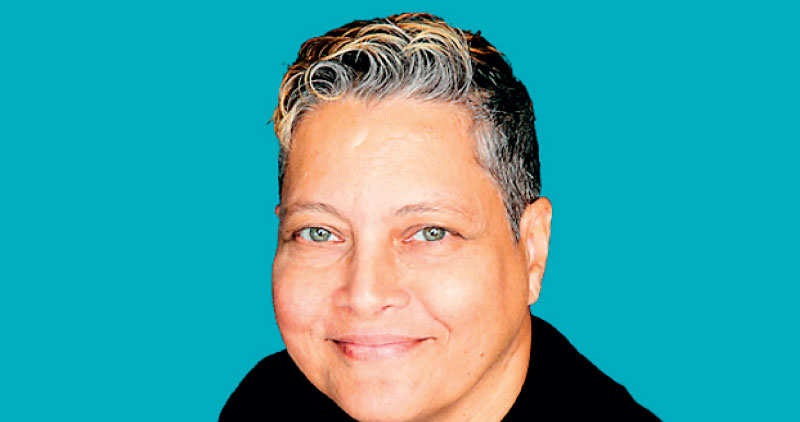Sunday Feb 22, 2026
Sunday Feb 22, 2026
Monday, 28 March 2022 00:55 - - {{hitsCtrl.values.hits}}

Equal Ground Founder and Executive Director Rosanna Flamer-Caldera
Equal Ground yesterday welcomed a landmark decision by a UN human rights body which has found that the criminalisation of consensual, same-sex relations between women in Sri Lanka is a human rights violation.
The decision in a case brought by Rosanna Flamer-Caldera to the Convention on the Elimination of All Forms of Discrimination against Women (CEDAW) committee at the UN, with the support of the Human Dignity Trust (HDT), sets a major legal precedent, holding that the criminalisation of lesbian and bisexual women violates the Convention. This case, filed by a Sri Lankan woman, has far reaching implications for lesbian and bisexual women across the globe, who suffer under laws that criminalise them for who they love.
The CEDAW Committee said that section 365A of the Penal Code of 1883 (amended in 1995) that criminalises same-sex sexual relations between consenting adults, compounds discrimination against women in Sri Lanka, and as such, violates lesbian and bisexual women’s right to non-discrimination under article 2 (a) and (d)–(g) of the Convention. It also noted that that decriminalisation of consensual same-sex relations is essential to prevent and protect against violence, discrimination and harmful gender stereotypes.
Sections 365 and 365A of Sri Lanka’s Penal Code, which states that “carnal intercourse against the order of nature” and “acts of gross indecency” are criminal offences punishable by the law, carrying a sentence of up to 10 years, criminalises same-sex sexual relations between consenting adults and are used against the Lesbian, Gay, Bisexual, Transgender, Intersex, and Queer/Questioning (LGBTIQ) community in Sri Lanka, primarily.
The CEDAW committee urged the Government to decriminalise same-sex sexual relations. It also asked Sri Lanka to take measures to protect women against gender-based violence by adopting comprehensive legislation against discrimination against lesbian, bisexual, transgender and intersex women, and provide adequate protection, support systems and remedies, including reparation, to lesbian, bisexual, transgender and intersex women who are victims of discrimination. Further recommendations included, ensuring victims of gender-based violence, including lesbian, bisexual, transgender and intersex women, have access to effective civil and criminal remedies and protection, including counselling, health services and financial services, addressing workplace discrimination against LBTI women, and providing sensitisation training to law enforcement agencies.
“I am so ecstatic to hear of this decision as it is a major win for all of us,” said Flamer-Caldera. “The Sri Lankan Government has ratified CEDAW, and this is therefore further encouragement for them to repeal these discriminatory laws and free us from the stigma and violence caused by criminalisation.”
“This sends a strong message to Sri Lanka’s policymakers, as well as the international community, that ensuring the rights and equal treatment of all citizens– including LGBTIQ persons – and removing archaic, discriminatory laws, is foremost,” she added.
Flamer-Caldera’s case drew particular attention to the multiple forms of discrimination that lesbian and bisexual women face, because of their sexuality and their gender. It was argued that the discrimination within the law in Sri Lanka creates a hostile environment, legitimising widespread societal stigmatisation, violence and abuse.
Being the first of its kind, the decision by the CEDAW committee has implications on a global scale.
Lesbian, bisexual, and queer women activists and LGBTIQ rights organisations around the world have also welcomed the decision.
“This decision is significant for millions of criminalised lesbian and bisexual women around the world. Most of the 40-plus countries that currently criminalise same-sex intimacy between women have voluntarily signed up to the Convention and are now in clear and blatant violation of its binding legal obligations,” said Téa Braun, Chief Executive of HDT in the UK.
South African Lesbian Activist Steve Letsike, Executive Director of Access Chapter 2 and the current Chair of the Commonwealth Equality Network stated, “This kind of ruling demonstrates the truth that has been denied for so many aching years!”
Described as an international bill of rights for women, the Convention is also an agenda for action by countries to guarantee the enjoyment of those rights, with the vast majority of UN member states being bound by it.
Flamer-Caldera and HDT worked on her case for almost eight years, building on evidence from the reports Breaking The Silence and Struggling against Homophobic Violence and Hate Crimes, along with first hand narratives from Flamer-Caldera describing life in Sri Lanka for women such as herself, and highlights the local and global extent and impact of criminalisation of lesbian and bisexual women.
“It has been a long journey getting here, but I am satisfied with the ruling and happy that the years of hard work on this case was successful. This ruling will not only affect the community here but all over the world,” said Rosanna Flamer-Caldera.
Flamer-Caldera has been an LGBTIQ and women’s rights activist for the past 22 years and is the Founder and Executive Director of Equal Ground.
Equal Ground is a nonprofit organisation seeking economic, social, cultural, civil and political rights for the Lesbian, Gay, Bisexual, Transgender, Intersex and Questioning/Queer (LGBTIQ) community of Sri Lanka. It is committed to creating a safe space for all LGBTIQ individuals and to providing opportunities for self-help including mental well-being, economic, social and political empowerment, access to health, education, housing and legal protection for the LGBTIQ community. Founded in 2004 Equal Ground is also the oldest organisation of this nature functioning in the country.